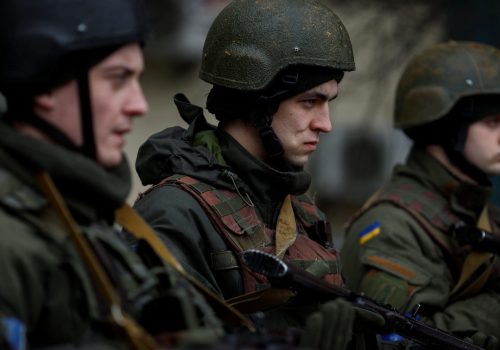March 16, 2022
FAST THINKING: Reading between the lines of Zelenskyy’s address to Congress
JUST IN
With his country under constant bombardment by Russian forces, Ukrainian President Volodymyr Zelenskyy beamed into Washington on Wednesday with a video message for Congress: “We need you right now.” Apparently recognizing that the United States and its NATO allies are unlikely to implement a no-fly zone over Ukraine, he asked for other forms of firepower to help fend off the Russian assaults that are decimating his cities. Shortly after, US President Joe Biden answered Zelenskyy’s call by pledging to send him drones along with anti-aircraft and anti-armor weapons. In a Twitter Space following his speech, our experts reacted to Zelenskyy’s emotional appeal—and weighed in on whether US thinking on defending Ukraine could continue to shift as the war worsens.
TODAY’S EXPERT REACTION COURTESY OF
- John Herbst (@JohnEdHerbst): Senior director of the Eurasia Center and former US ambassador to Ukraine
- Barry Pavel (@BarryPavel): Senior vice president and director of the Scowcroft Center for Strategy and Security
- Tyson Wetzel (@gorillawetzel): Senior US Air Force fellow at the Scowcroft Center
Major megaphone
- While Zelenskyy has made no secret of asking world leaders for help in recent weeks, John says that Biden administration officials were still wary ahead of Wednesday’s address: “They’ve been bracing for it because they understand they’ve been too timid” about boosting US military support for Ukraine.
- When combined with his eloquence, Barry believes, Zelenskyy’s use of powerful images of Ukraine’s suffering also likely struck a strong chord. “They sear into your brain, they tug on your emotions in a way that boring policy papers and speeches do not.”
- Understanding his audience helped too, John says: “Zelenskyy knows Congress is a potential ally” that could help pressure the Biden administration.
Subscribe to Fast Thinking email alerts
Sign up to receive rapid insight in your inbox from Atlantic Council experts on global events as they unfold.

A matter of time
- Acting quickly is important, Tyson explains, because the Russian military may be losing steam. Getting the right weapons in Ukrainians’ hands—particularly S-300 surface-to-air missile systems, shoulder-fired weapons, and weaponized drones—is much more effective than hand-wringing over establishing no-fly zones or transferring MiG-29 fighter jets, he says: “Don’t lose the forest for the trees. There’s a lot more that we could be doing.”
- Speaking of no-fly zones: John says it’s more of a possibility than many might think—so long as it’s a clearly announced humanitarian airlift that doesn’t involve taking out the enemy’s air defenses. “Then you put the onus on the Kremlin for initiating hostilities.”
- And while the White House and American public might not be ready for that level of action now, he added, “another two weeks of nasty Russian behavior—which is pretty much guaranteed—and that may well shift.”
Thinking bigger
- Barry hopes the debate over how exactly to help Ukraine moves US decision-makers to think bigger about collaborative ways to respond to geopolitical challenges, such as potentially seizing on Zelenskyy’s idea of a “U24” coalition of peacekeeping countries. “This is a time for creativity in the policy community,” he said.
- While he agreed, John said the world is still “in 1942 of the war,” in reference to how policymakers birthed their brightest ideas—the United Nations, for instance—in the waning stages of the Second World War. “The most pressing thing is to ensure that Ukraine does not lose this fight,” he said.
Further reading
Tue, Mar 15, 2022
Ukraine’s exodus escalates as millions more prepare to flee Putin’s invasion
UkraineAlert By Andrew D’Anieri
As Vladimir Putin's invasion of Ukraine continues to escalate, millions more Ukrainians are expected to flee the country in the coming days to escape Russian war crimes and the horrors of occupation.
Sun, Mar 13, 2022
The Western response to Putin’s war has been remarkable. But it’s not enough.
Inflection Points By Frederick Kempe
Vladimir Putin will continue to escalate if more isn't done to stop him.
Wed, Mar 9, 2022
What’s left to sanction in Russia? Wallets, stocks, and foreign investments.
New Atlanticist By Brian O’Toole, Daniel Fried
There are still some tools left for the West to escalate sanctions against Russia in response to its aggression against Ukraine—including an Iran-style approach.
Image: Ukrainian President Volodymyr Zelenskyy addresses members of the US Congress in a video message on March 16, 2022. Photo by Sarah Silbiger/REUTERS


